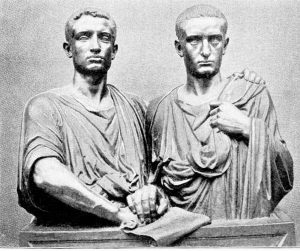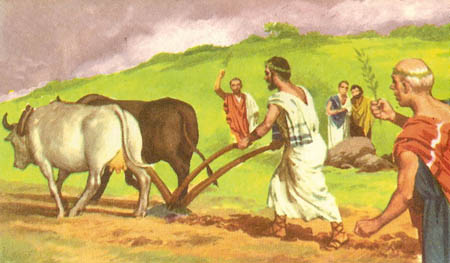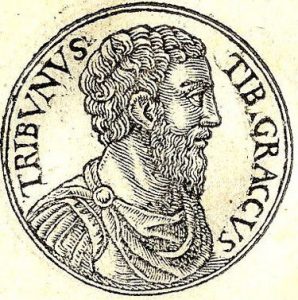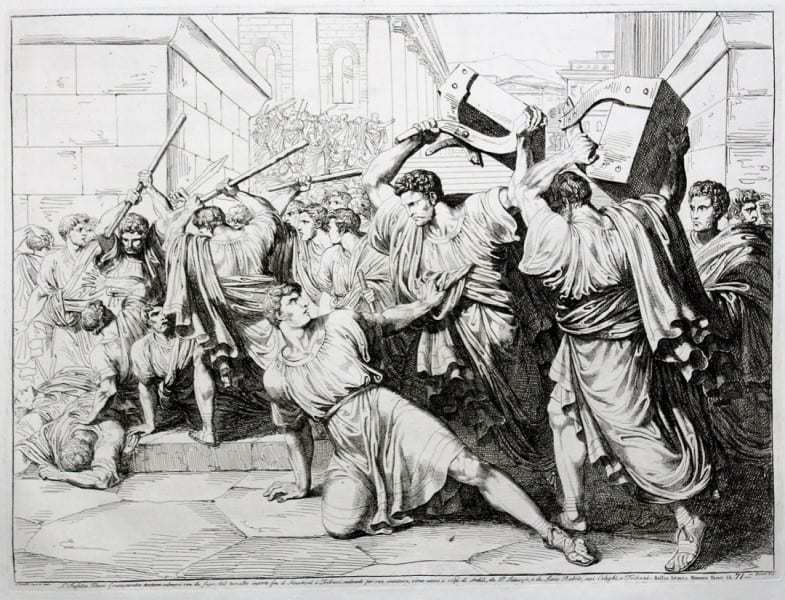Octavius, freshly having been removed from the office of Tribune, had been thrown onto the streets. No longer sacrosanct by virtue of his office (the status of being untouchable and unkillable), he had been murdered by the very common people he had performed much injustice towards for so long.1 Tiberius Gracchus now not only had the ability to pass his agrarian reform law, but he also received the fear and resentment of his fellow Tribunes.

Tiberius was a sophisticated Roman not only in his speech, but also in his education, particularly in the ways of Greek enlightenment.2 This, of course, went hand in hand with his politics and liberal way of handling the government. The reason why he had been educated in such manners at a young age was the state of Rome in which he had grown up, as well as being born of distinguished blood as his mother, Cornelia, was the daughter of Scipio Africanus.3
Due to the immense influx of slaves into the latifundia of Italy, moderate and small farmers in the land had been replaced by the wealthy land-accumulating aristocrats employing these tens of thousands of slaves. This phenomena effectively cut the Roman soldier supply as well, due to the army’s recruits originating from those moderate and small farmers who supplied themselves with their own gear, as serving Rome was seen as a great honor.4 The displaced farmers rushed to Rome in search of jobs, but were not able to find jobs to fill their day. Left to their own devises, with the free time and poverty, these Romans stewed in their anger. Tiberius Gracchus was born into this world…
Born Plebian, but of noble origins, Tiberius had grown in the arts and in philosophy. Unfortunately, as Tiberius’ father had been old when Tiberius was born, he died when Tiberius was of a young age. Inspired not just by his father’s work, but by the honor of serving Rome as soon as he had become old enough to enlist, Tiberius became a military tribune. As tribune, he was shipped to serve in the final war between Rome and Carthage with his half-brother, Scipio Amelíanus. According to popular folktales of the time, Tiberius Gracchus was the first over the wall when Carthage fell. Upon returning from the war, he was elected quaestor. Unfortunately, he was then sent to serve in the Numantian wars, where he had the tragedy of serving under Gaius Mancinus, who despite leading Rome into defeat after defeat, Tiberius still held him in respect.5
After yet another defeat, Gaius Mancinus attempted to withdraw his army in the middle of the night. Unluckily, the Numantians had overheard and smashed through their rear guard and put them onto hostile and almost impossible terrain to defend from. Admitting defeat, he sent for envoys to negotiate a surrender, which in response, the Numantians stated that they would negotiate with no man other than Tiberius Gracchus. The reason the Numantians would speak with no other than Tiberius Gracchus was because of his father’s work, for which they held ample respect due to not just the many great victories he had won, but also because he had made sure Rome would abide by its terms of peace. Thankfully, with these negotiations Tiberius was able to secure the safety of around 20,000 Roman citizens from becoming enslaved or killed. But upon returning home, instead of receiving cheers, he was met with his first taste of ridicule from the elite who had said that the campaign was a disgrace and had made Rome look weak, especially by signing the peace treaty. Fortunately, he also was met with his first taste of popularity, as the families of the Roman citizens he had saved had supported and hailed him. So, when a vote had come to decide the fate of Tiberius and all the officers of the lost war, the people voted to have them saved, and only Gaius Mancinus had been sent to the Numantians in chains.6

Returning from the Spanish Wars and overcoming the accusations of cowardice, Tiberius looked at the lands in Italy and had yet to see one non-slave working the fields.5 This state of affairs only enriched the powerful and wealthy senators while weakening vast numbers of poor farmers. Upon seeing this, Tiberius sought a remedy. He thought that by limiting all Roman citizens to no more than 500 acres of land, the problem could be solved. In the fashion of proclaiming the mos majorum, or the ways of the ancestors, Tiberius sought to bring back the ancient laws, specifically the Lex Agraria, which limited all land owners to no more than 500 acres of land. Setting on his quest, Tiberius ran for Tribune.8 After securing the position of Tribune, Tiberius wrote a law that, instead of punishing land owners with more than 500 acres, it asked that they simply return the excess land.
In fear of losing their land, the wealthy Romans spread the word to convince common citizens of the Republic that Tiberius’ law was “un-Roman” and was simply a way to make a Gracchi into a king. Fortunately, the common Romans had experienced first-hand what it had felt like living under these aristocratic Romans’ thumbs. Therefore, Tiberius’ law passed.5 But the wealthy had convinced one of the Roman tribunes to veto the law. This veto was shocking. The veto was commonly seen as a safeguard used very sparingly or rarely to stop an action that was unbeneficial to the Plebians of Rome. This was the first crack in the Roman Republic, as the veto was well respected and used sparingly for many years.5
Unphased by the veto, Tiberius went on and rewrote a more stern law, only for it to be vetoed yet once again by Marcus Octavius. In retaliation, Tiberius used his veto to stop every law that was in the process of being passed, as well as using his powers to stop all money coming out of the treasury as an effective way to bring the government to a halt.11 Angered by Tiberius’ halt of government, the powerful had begun to scheme against Tiberius. Angered by the constant disrespect of not just the office of tribune, but of Tiberius himself, he moved to have a re-election of the other Tribune Octavius by popular vote. Octavius came up short in the vote. And freshly having been removed from the office of Tribune, he was thrown out onto the streets. He no longer was sacrosanct, or untouchable and unkillable because of his office. And he was murdered by the very common people to whom he had performed the injustice of vetoing reforms for so long. After a political dispute in which Tiberius had almost denounced and gave the same fate of Octavius toward his opponent, Tiberius needed to ensure his sacrosanctity. Despite the law stating that no man could stand for re-election without an interval period without holding office, Tiberius went on to run for Tribune again, which was unheard of, as no one has attempted to secure Tribune twice in a row in over 200 years. When the time of voting for Tribunes came, Tiberius had seen that he did not have enough voters to win, so he gathered his friends and stalled for enough time for the voting to have been closed for the day.12
The following day, despite many bad omens, Tiberius had returned and motioned to speak to the crowd upon hearing warnings of his assassination at the hands of the wealthy. Upon hearing this, the crowd armed themselves, ready to protect Tiberius. But at the edge of the crowd, many were left clueless as to why Tiberius’ supporters had armed themselves. In an attempt to explain to the crowd what was happening, Tiberius climbed into view and pointed towards his head to symbolize that he is being plotted against. Upon mis-understanding this, P. Scipio Nasica, the Pontifex Maximus, relayed straight to the senate, which was meeting in the Temple of Fides, that Tiberius was asking for a crown.8 Angered by this, the senators ran towards the forum to enact a self “justice” of the law. Tiberius, as well as three-hundred of his followers, died in the ensuing battle. This was the first great act of political violence in Rome, setting a precedent for the future and effectively crumbling a pillar of civil morality in the Roman Republic.

The rest of Tiberius’ followers had either been exiled or murdered.8 When Gaius Gracchus asked for his brother’s body, the senate refused, as they had already thrown his body into the Tiber River. Angered by this, Gaius Gracchus took his brothers death to heart and began plotting his revenge. Thus, having committed the first great act of political violence in Rome, they had committed not just a crime, but sacrilege. This set a precedent for the future, for what would be called the Roman Civil Wars.
- “The Brothers Gracchi – How Republics Fall – Extra History – #1,” YouTube, 2016, accessed October 23 2022, https://www.youtube.com/watch?v=ODI1VOOoey0&list=PLhyKYa0YJ_5B6Z5nLF5o46E3mVIlWeNjP&index=1; “The Gracchi Brothers,” Ancient Rome History at UNRV.com, accessed October 20, 2022, https://www.unrv.com/empire/gracchi-brothers.php ↵
- “Tiberius Sempronius Gracchus,” Encyclopædia Britannica Online, 1998, https://www.britannica.com/biography/Tiberius-Sempronius-Gracchus. ↵
- “The Brothers Gracchi – How Republics Fall – Extra History – #1”, YouTube, YouTube, 2016, accessed October 23 2022, https://www.youtube.com/watch?v=ODI1VOOoey0&list=PLhyKYa0YJ_5B6Z5nLF5o46E3mVIlWeNjP&index=1. ↵
- Hugh Last M.A, “Tiberius Gracchus,” Cambridge Ancient History: The Roman Republic IX, (Cambridge, UK: Cambridge University Press, 1977), 1-38. ↵
- “The Brothers Gracchi – How Republics Fall – Extra History – #1,” YouTube, 2016, accessed October 23 2022, https://www.youtube.com/watch?v=ODI1VOOoey0&list=PLhyKYa0YJ_5B6Z5nLF5o46E3mVIlWeNjP&index=1; “The Gracchi Brothers,” Ancient Rome History at UNRV.com, accessed October 20, 2022, https://www.unrv.com/empire/gracchi-brothers.php ↵
- “The Brothers Gracchi – How Republics Fall – Extra History – #1,” YouTube, 2016, accessed October 23 2022, https://www.youtube.com/watch?v=ODI1VOOoey0&list=PLhyKYa0YJ_5B6Z5nLF5o46E3mVIlWeNjP&index=1. ↵
- “The Brothers Gracchi – How Republics Fall – Extra History – #1,” YouTube, 2016, accessed October 23 2022, https://www.youtube.com/watch?v=ODI1VOOoey0&list=PLhyKYa0YJ_5B6Z5nLF5o46E3mVIlWeNjP&index=1; “The Gracchi Brothers,” Ancient Rome History at UNRV.com, accessed October 20, 2022, https://www.unrv.com/empire/gracchi-brothers.php ↵
- Hugh Last M.A, “Tiberius Gracchus,” Cambridge Ancient History: The Roman Republic IX (Cambridge, UK: Cambridge University Press, 1977), 1-38. ↵
- “The Brothers Gracchi – How Republics Fall – Extra History – #1,” YouTube, 2016, accessed October 23 2022, https://www.youtube.com/watch?v=ODI1VOOoey0&list=PLhyKYa0YJ_5B6Z5nLF5o46E3mVIlWeNjP&index=1; “The Gracchi Brothers,” Ancient Rome History at UNRV.com, accessed October 20, 2022, https://www.unrv.com/empire/gracchi-brothers.php ↵
- “The Brothers Gracchi – How Republics Fall – Extra History – #1,” YouTube, 2016, accessed October 23 2022, https://www.youtube.com/watch?v=ODI1VOOoey0&list=PLhyKYa0YJ_5B6Z5nLF5o46E3mVIlWeNjP&index=1; “The Gracchi Brothers,” Ancient Rome History at UNRV.com, accessed October 20, 2022, https://www.unrv.com/empire/gracchi-brothers.php ↵
- “The Gracchi Brothers,” Ancient Rome History at UNRV.com, accessed October 20, 2022, https://www.unrv.com/empire/gracchi-brothers.php. ↵
- UNRV Authors, “The Gracchi Brothers.” Ancient Rome History at UNRV.com, Accessed October 20, 2022, https://www.unrv.com/empire/gracchi-brothers.php ↵
- Hugh Last M.A, “Tiberius Gracchus,” Cambridge Ancient History: The Roman Republic IX (Cambridge, UK: Cambridge University Press, 1977), 1-38. ↵
- Hugh Last M.A, “Tiberius Gracchus,” Cambridge Ancient History: The Roman Republic IX (Cambridge, UK: Cambridge University Press, 1977), 1-38. ↵



10 comments
Shecid Sanchez
Congratulations on your award nomination! Ive actually never heard about this so it was very interesting to read and learn about. I loved the amount of details that went into your article and how the re-election Law is. Overall great job on your article and good look on y out nomination.
Dallasstar Johnson
Cheers on the publishment; it is so interesting! The storyline in the piece is interesting and keeps you interested in Tiberius Gracchus’ political career. It will be fascinating to see how Gaius Gracchus exacts his retribution and how that will affect Rome. It was a great article! Even though I didn’t know much about Tiberius, reading about his enlistment in the Roman army was fascinating.
Helena Griffith
Tiberius needed to maintain his holiness following a political disagreement in which he nearly denounced and sentenced his opponent to the same death as Octavius. In spite of the statute prohibiting men from running for office more than once without a gap of at least two years, Tiberius decided to run for Tribune again.
Courtney Mcclellan
Really good article. I had never heard about this violent time in Roman history since other tales get way more attention like Julius Cesar. You have a really good story telling technique. From start to finish you really capture the readers attention. Your images are very nice and fit very will within the story.the fact that so many of Tiberius’s followers died when he did astounds me.
Francisco Caballero
This was a great article! I did not have an extensive knowledge about Tiberius but it was interesting to read about how he got his start in the Roman military.
Eugenio Gonzalez
The article is fascinating; it has compelled narrative that keeps you interested in the political career of Tiberius Gracchus. The author did a splendid job of setting the time frame and ending the article with an introduction to a new story of the revenge of Gaius Gracchus. It would be interesting to see how Gaius Gracchus takes revenge and how it affects Rome.
Kelly Guadalupe Arevalo
Wow. Great article! I had not heard of Tiberius Gracchus before and your article was very informative. I like how you presented the story, explaining the context of the time and highlighting its function as a precedent to the Roman Civil Wars. Also, it was great how at the end you showed the begging of a new story. I hope to read more from you soon. Just by the title, I thought that you were about to talk about Julius Cesar, still, the roman leaders never cease to amaze me.
Vianey Centeno
After a political dispute in which Tiberius had almost denounced and gave the same fate of Octavius toward his opponent, Tiberius needed to ensure his sacrosanctity. I loved this detail in the article because despite the law stating that no man could stand for re-election without an interval period without holding office, Tiberius went on to run for Tribune again, which was unheard of, as no one has attempted to secure Tribune twice in a row in over 200 years.
Brenda
I cannot wait to read Part 2 of Gaius Gracchus revenge on his brother’s death
Chantelle
Beautiful writing! Lovely writer. hope to see more of your writing sir!